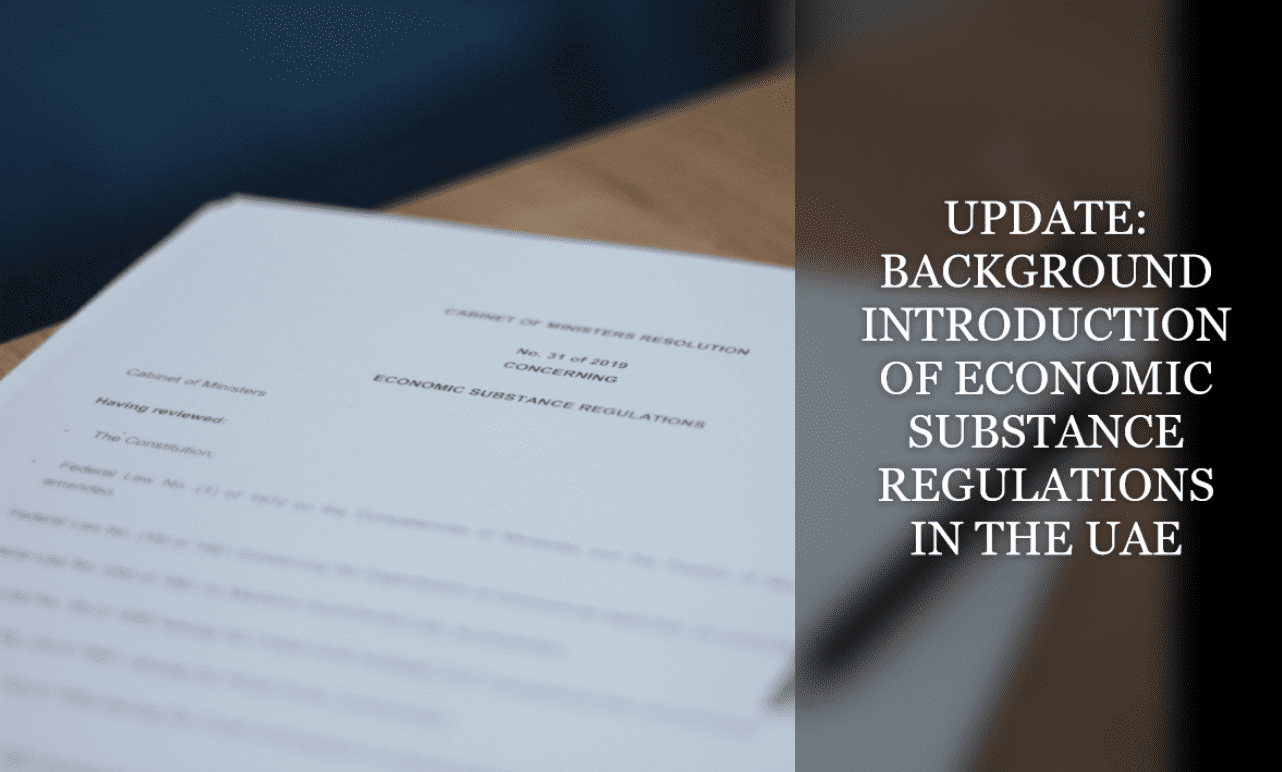Update: Background Introduction of Economic Substance Regulations in the UAE

See our previous article on this subject: Background Introduction of Economic Substance Regulation in the UAE
See our new updated article on this subject: Ministry of Finance: Update on UAE Economic Substance Regulations
The European Union (“EU”) in 2017 had included the United Arab Emirates (UAE) in the list of non-cooperative jurisdictions. The blacklisting was on concerns about shifting of profits mainly for the reasons of either No or only Nominal (NOON) Tax, lack of transparency and exchange of information, and lack of substance requirements.
Subsequently, the UAE was moved to the grey list following its commitments made to resolve the EU’s concern and to implement Base Erosion and Profit Shifting (BEPS) related measures. UAE, being a member of the inclusive framework on BEPS, meant the implementation of minimum standards to comply with the EU and OECD requirements.
The Economic Substance Regulations (ESR) can form a basis to support that the claim that the incorporation/investment in the UAE was not solely for the purpose of benefiting from a privileged tax structure. Since the burden of proving that the business has economic activity in the UAE is on the business itself, the ESR brings in specific requirements for UAE businesses to demonstrate actual economic activity in the UAE.
Background of how ESR was introduced in the UAE
- Consequent to UAE’s commitment, Economic Substance Regulations vide Cabinet of Ministers Resolution No 31 of 2019 were released with effect from 30 April 2019.
- Determination of Regulatory Authorities vides Cabinet Resolution No.58 of 2019 was issued in November 2019.
- Directives for Implementation of ESR vide Ministerial Decision No 215 of 2019 were released with effect from 11 September 2019.
- Frequently Asked Questions (FAQs) on the Economic Substance Regulations (issued vide Ministerial Resolution No 31 of 2019) along with guidance on Relevant Activities were clarified in January 2020.
APPLICABILITY OF ECONOMIC SUBSTANCE REGULATIONS
The ESR is applicable to all-natural and juridical persons carrying out Relevant Activities (RA) in the UAE including Free Zone and Financial Free Zone. Following the intention behind introducing the ESR and following the law in its spirit, it is interpreted that Offshore companies are included in the Free Zone companies. This stand has been clarified by the Ministry of Finance (MOF) in the Frequently Asked Questions.
Companies in which the Federal Government or the Government of any Emirate of the UAE or any governmental authority or body of any of them has at least 51% direct or indirect ownership in its shareholding are not subject to the ESR.
WHICH ENTITIES ARE COVERED UNDER THE SCOPE OF ESR?
Any entity registered in the UAE or any person having a commercial license, certificate of incorporation, or any other form of a permit issued by a Regulatory Authority (as mentioned in the Cabinet Resolution No. 58 of 2019) that undertake any one or more of the following activities are covered under the scope of ESR: -
- Banking Business
- Insurance Business
- Investment Fund Management Business
- Lease Finance Business
- Headquarters Business
- Shipping Business
- Holding Company Business
- Intellectual Property Business
- Distribution and Service Center Business
WHAT ARE THE ECONOMIC SUBSTANCE REQUIREMENTS?
For an entity to satisfy the economic substance requirements in relation to a Relevant Activity, it must:
- Conduct the relevant “Core Income Generating Activities” (CIGA) in relation to Relevant Activities in the UAE;
- Be “directed and managed” in the UAE in relation to its CIGA; and
- With reference to the level of activities performed in the UAE
- Have an adequate number of qualified full-time employees in the UAE.
- Incur an adequate amount of operating expenditure in the UAE.
- Have adequate physical assets in the UAE.
Note: As clarified by the MOF in its FAQs, a Licensee can outsource any or all of its CIGAs so long as the outsourced activities are performed in the UAE. However, a licensee CANNOT outsource the “directed and managed” aspect of the requirement as it has to demonstrate oversight and control of its Relevant Activity in the UAE.
WHAT ARE OTHER ASPECTS THAT WERE CLARIFIED IN THE FAQS?
The MOF issued FAQs on ESR on the 05th of January 2020. The FAQs consist of 41 questions covering the scope, definitions of relevant activities, economic substance tests, and other administrative aspects. Some of these clarifications have been summarized here:
- With respect to the lease-finance business, the economic substance regulations do not apply to credit and other financing and leasing arrangements where there is no consideration either in the form of interest, fees, rental payments, capital gains, or other forms of compensation. The grant of security in favor of a lender does not constitute consideration.
- An entity that undertakes an RA (irrespective of whether income has been earned from the RA during the relevant financial period) must submit an annual notification to its regulatory authority declaring whether the company undertakes any RAs. However, the regulatory authority has the power to ask the licensee to demonstrate that Relevant Activity is not carried during the reporting period.
- Only entities that earn income from an RA during the relevant financial period are required to demonstrate economic substance in the UAE and file an economic substance return.
- Licensees that are part of the same group cannot be aggregated for economic substance purposes. Each Licensee will need to comply with the Regulations and demonstrate economic substance on an individual basis. However, aspects such as staff, functions, and assets maintained in the UAE by a group entity and made available to another group entity can be considered by the group entity if it is pursuant to a service agreement.
- For being compliant with the “directed and managed” aspect of requirement, it was clarified that the directors need not be residents of the UAE. It would be sufficient if they are physically present in the UAE to attend the relevant board meetings.
HOW SHOULD LICENSEES PREPARE FOR FUTURE AUDITS FOR ESR?
The regulatory authorities have been given the power to initiate audits within 6 years from the end of the Financial Year in which the report of Economic Substance is filed. This means the entities are required to maintain documentation, details, and relevant records over the said period of 6 years from the end of the Financial Year in which the report is filed.
In order to demonstrate that adequate economic substance is maintained in the UAE, an entity should
- Identify the type and amount of income earned from Relevant Activity.
- Identifying related expenses, staff, premises, and other assets that are in the UAE and used for carrying out the CIGAs.
- Maintain proper documentation of management and control in the UAE of the CIGA.
WHAT ARE THE CONSEQUENCES OF NON-COMPLIANCE?
A. Penal consequences for: -
- Failure to meet Economic Substance Tests
- First Year – AED 10,000 - 50,000 and information exchange with the foreign competent authority.
- Subsequent Year – AED 100,000 – 300,000 and information exchange with the foreign competent authority.
- Failure to provide information or furnishing inaccurate information – AED 10,000 to 50,000.
RECENT UPDATES ON ECONOMIC SUBSTANCE NOTIFICATION DEADLINES
The annual notification deadlines are as follows:
- Dubai International Financial Center (DIFC): The earlier deadline of 31 March 2020 has been postponed and notified to the licensees by way of a notification, to date likely to fall in Quarter 2 of 2020. However, the exact date is yet to be announced.
- Abu Dhabi Global Market (ADGM): The earlier deadline of 31 March 2020 has been postponed and notified to the licensees by way of a notification. However, the exact date is yet to be announced.
- Ras Al Khaimah International Corporate Center (RAKICC): The deadline for submission of Economic Substance Notification is 30 June 2020.
If you have any questions or want to get a comparative analysis of the advantages of offshore and onshore companies in the UAE for your business, please contact us.
PANKAJ KANJANI
Senior Tax Consultant of Garant Business Consultancy



